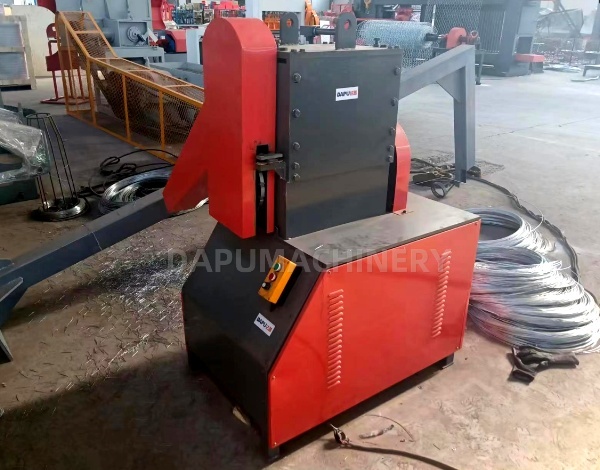
What Is a Steel Fiber Machine and Why It’s Crucial for Concrete Reinforcement Projects?
Category:News
Author:
Source:
Add time:2025-04-25 11:23
The steel fiber machine is a specialized device designed to produce high-quality steel fibers that enhance concrete durability. For markets like South America and the Middle East, where infrastructure demands are surging, this technology is not just useful but essential. Let’s explore why steel fiber machines matter and how the DAPU Steel Fiber Machine DP-2000 addresses critical pain points in these regions.

The Growing Need for Steel Fiber Machines in Emerging Markets
Emerging economies are racing to build roads, bridges, industrial facilities, and residential complexes. Yet, these regions face unique challenges:
Harsh Climates: Extreme heat, humidity, or coastal salinity accelerate concrete degradation.
Cost Pressures: Budget constraints demand affordable yet durable solutions.
Labor Shortages: Skilled workers for traditional rebar installation are scarce.
Time Efficiency: Projects must meet tight deadlines without compromising quality.
Steel fibers offer a practical alternative to traditional rebar. When mixed into concrete, they create a 3D reinforcement network that resists cracks, improves load-bearing capacity, and extends structure lifespan. However, producing consistent, high-performance steel fibers requires advanced machinery—enter the steel fiber machine.
Key Pain Points in Emerging Markets—Solved by Steel Fiber Machines
1. Durability in Extreme Environments
In regions like the Middle East (desert heat) or coastal South America (salt corrosion), concrete structures degrade rapidly. Traditional rebar rusts, leading to costly repairs. Steel fibers, especially those made from stainless steel or galvanized wire, resist corrosion and distribute stress more evenly. The DAPU DP-2000 supports multiple raw materials, enabling tailored solutions for local conditions.
2. Affordability and Resource Efficiency
Countries in Africa and Southeast Asia often operate on tight budgets. Steel fiber machines reduce dependency on expensive imported rebar and minimize labor costs. For example, the DP-2000 produces 2-7 tons of steel fibers per shift—enough to reinforce hundreds of cubic meters of concrete at a fraction of traditional costs.
3. Simplified Logistics and Labor Requirements
Transporting heavy rebar to remote sites in regions like the Amazon Basin or rural Africa is logistically challenging. Steel fibers are lightweight, easy to store, and require no specialized workers for installation. The DP-2000’s compact design (1×0.72×1.5m) and moderate weight (1200kg) make it portable and suitable for small workshops or on-site production.
4. Speed and Scalability
Rapid urbanization in Southeast Asia demands faster project delivery. With a 3kW motor and adjustable settings, the DP-2000 produces fibers in various lengths (up to 60mm) and shapes (hooked, flat, wave), allowing contractors to customize reinforcement for slabs, tunnels, or precast elements without downtime.
DAPU Steel Fiber Machine DP-2000: Technical Specifications Tailored for Global Needs
The DAPU DP-2000 isn’t just a machine—it’s a solution engineered for versatility and reliability. Here’s how its parameters align with market demands:
| Parameter | Specification | Regional Benefit |
|---|---|---|
| Productivity | 2-7 tons/shift | Ideal for small to medium projects; reduces idle time in low-demand regions. |
| Wire Diameter | 0.3-1mm | Compatible with thin, high-strength fibers for lightweight concrete applications. |
| Max. Fiber Length | 60mm | Optimized for crack resistance in industrial flooring or seismic zones. |
| Motor Power | 3kW | Low energy consumption—critical in areas with unstable power grids. |
| Tensile Strength | 600-2880 kPa | Ensures fibers withstand heavy loads in bridges or warehouse floors. |
| Raw Materials | Stainless steel, galvanized wire, iron wire | Adapts to local material availability and environmental needs. |
| Fiber Shapes | Hooked, flat, wave | Multiple options for bonding strength in diverse concrete mixes. |
Real-World Applications: Where Steel Fibers Make a Difference
Roads & Highways (South America): In Colombia’s rainy Andes region, steel fiber-reinforced concrete reduces pothole formation and extends road lifespan.
Coastal Infrastructure (Middle East): Dubai’s ports use galvanized steel fibers to combat saltwater corrosion in breakwaters.
Affordable Housing (Africa): Kenyan contractors mix wave-type fibers into concrete blocks for earthquake-resistant, low-cost homes.
Precast Factories (Southeast Asia): Vietnamese manufacturers leverage hooked-end fibers for faster production of drainage pipes and panels.
Why Choose DAPU’s Steel Fiber Machine?
The DP-2000 stands out by addressing the core concerns of emerging markets:
Low Maintenance: Simple mechanical design minimizes repair needs—a boon for regions with limited technical expertise.
Flexibility: Processes diverse materials (even recycled wire) to cut costs.
Energy Efficiency: 3kW motor keeps operational costs low in energy-scarce areas.
Compact Footprint: Fits into small factories or mobile setups.
Conclusion: Building Stronger Futures with Smart Technology
For contractors and developers in South America, the Middle East, Southeast Asia, and Africa, the DAPU Steel Fiber Machine DP-2000 isn’t just equipment—it’s a strategic investment. By enabling faster, cheaper, and longer-lasting concrete solutions, it empowers communities to build infrastructure that survives the test of time and nature. In markets where every dollar and day counts, this machine isn’t just important—it’s indispensable.
Whether you’re reinforcing a highway in Peru or a high-rise in Vietnam, steel fiber technology bridges the gap between ambition and reality. And with machines like the DP-2000, that future is closer than ever.
Recommend News




